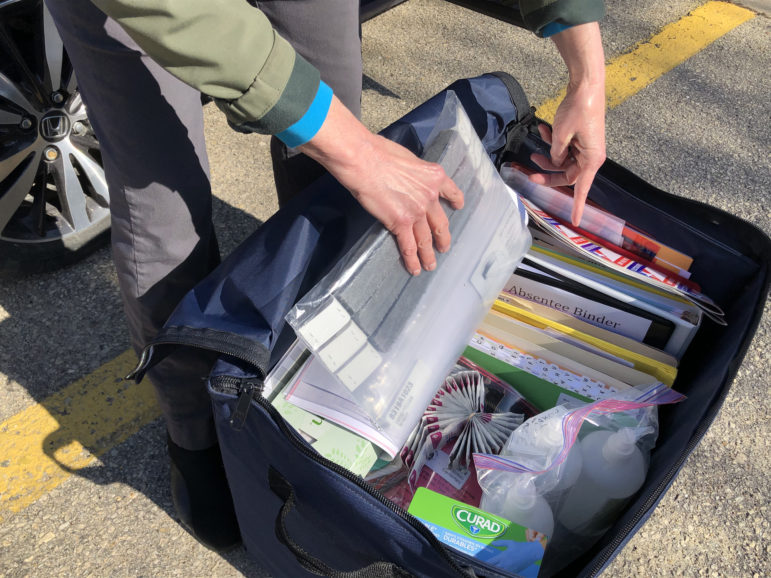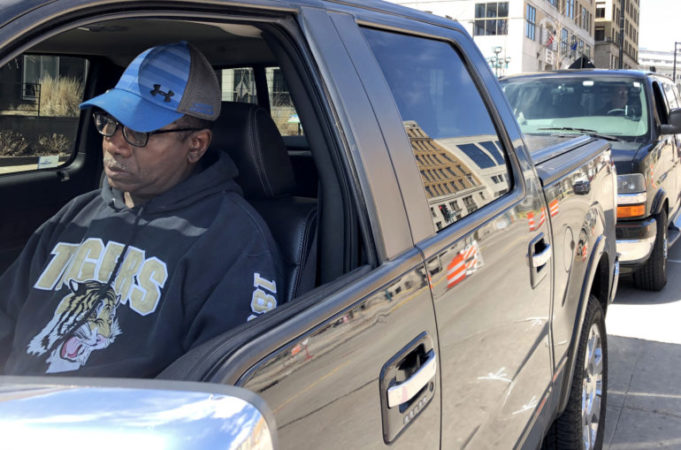Brook Soltvedt has worked the polls in Madison, Wisconsin, for at least 13 years. Election Day is usually a long one for poll workers, stretching far beyond voting hours, which run from 7 a.m. to 8 p.m.
But this year’s election is the first to coincide with a pandemic. So Soltvedt, a chief election inspector, is going to extremes to get ready, even as Democratic Gov. Tony Evers on Monday briefly suspended Tuesday’s in-person voting — a move that was quickly overturned after Republicans appealed it to the conservative-leaning Wisconsin Supreme Court.
“They (voters) are just scared right now,” Evers said in announcing his executive order. “They want a governor of the state to stand up for them — that’s what I’m doing.”
The governor, in his response to the Republicans’ lawsuit, said “the COVID-19 virus has turned the polling place itself into a life-threatening danger.”
Soltvedt, a 60-year-old textbook editor, has isolated herself for more than two weeks to minimize exposure to the coronavirus. And after managing the polling site at Thoreau Elementary School on Madison’s near West Side, her plan is to quarantine for two more weeks to avoid making her 77-year-old husband, Dave Nelson, sick.
Said Soltvedt, “When I get home Tuesday night, I’m going to strip in the garage, put my clothes in the washer and go downstairs for two weeks.”
Because so many workers have declined to participate out of fear of the pandemic, the Madison City Clerk’s Office consolidated many of its polling places — a trend also playing out in other Wisconsin cities.
Thoreau Elementary will serve nearby voters from Soltvedt’s toney Nakoma neighborhood as well as residents of Allied Drive, a low-income area where people who lack cars would have a circuitous bus ride to the polling place.

(Dee J. Hall / Wisconsin Watch)
Soltvedt praised staff from the clerk’s office as “heroes” for taking “extraordinary” measures to keep poll workers and voters safe and ensure votes are counted.
Those steps include providing gloves and plastic face shields for poll workers, some of whom will sit behind plexiglass shields fashioned by the city’s Engineering Department to separate them from voters. And everyone will receive hand sanitizer.
Voters may also use their own black or blue pens, rather than those handled by others and sanitized by poll workers. And Soltvedt expects a lot of people would choose curbside voting, which allows them to complete ballots in their vehicles or outside the school.
“I really feel confident that the city has done about the best that they can do to have this be a — well, I can’t say a safe election,” Soltvedt said Monday. “It’s not going to be a safe election. People are going to get sick from this.”
Besides transmission of the virus, Soltvedt’s main worry is widespread voter confusion.
A series of court decisions in recent days has triggered head-spinning changes to Wisconsin’s voting rules.
The requirement that a witness sign absentee ballots cast during Gov. Tony Evers’ statewide “Safer at Home” order was relaxed — then reinstated.
Soltvedt, vice president of the League of Women Voters of Dane County, wonders what will happen to the ballots already cast without a witness signature.
“Are they allowed to get a fresh ballot?” she asked. “And if so, how would that happen?”
The deadline for municipal clerks to receive a record 1.2 million-plus absentee ballots — pushed back from Election Day to April 13 by a federal judge — also remained in flux Monday as litigation continued to unfold.
Republicans late Saturday filed an emergency action with the U.S. Supreme Court. They argued for reinstating the normal deadline of Election Day, and warned of a “two-track” election with different deadlines for absentee and in-person voting. On Monday, some voters reported they still had not gotten absentee ballots requested weeks ago.
Soltvedt described this 2020 election — with its ever-changing rules overlaid by fears of a deadly pandemic — as “totally flying blind.” She said Tuesday’s voting will not be the end of it.
“This whole election,” Soltvedt said, “is going to get litigated to kingdom come.”
The nonprofit Wisconsin Watch (wisconsinwatch.org) collaborates with Wisconsin Public Radio, PBS Wisconsin, other news media and the University of Wisconsin-Madison School of Journalism and Mass Communication. All works created, published, posted or disseminated by Wisconsin Watch do not necessarily reflect the views or opinions of UW-Madison or any of its affiliates.




























